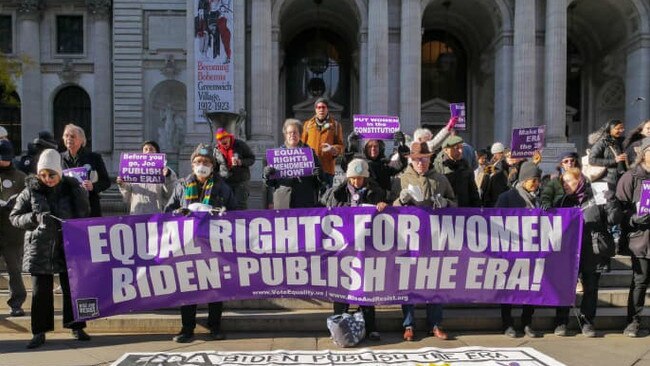Joe Biden asserts disputed gender equality amendment is ‘law of the land’
The announcement came just days before the US president is set to surrender power to Donald Trump, and is certain to face legal challenges and fierce objections from Republicans.

US President Joe Biden moved to enshrine the Equal Rights Amendment in the Constitution, declaring that the measure to prohibit sex-based discrimination had cleared the necessary hurdles to go into effect after a half-century of debate.
The announcement came just days before Biden is set to surrender power to President-elect Donald Trump, and it was certain to face legal challenges and fierce objections from Republicans.
“We, as a nation, must affirm and protect women’s full equality once and for all,” Biden said.
“I affirm what I believe and what three-fourths of the states have ratified: The 28th Amendment is the law of the land, guaranteeing all Americans equal rights and protections under the law regardless of their sex,” he added.
A senior administration official said Biden was stating an opinion that the amendment had been ratified. It wasn’t clear if Biden’s statement had any legal and practical weight.
Biden’s statement fell short of a request 46 Democratic senators signed in late November urging him to direct the Constitution’s official custodian, US Archivist Colleen Shogan, to formally publish the ERA as a ratified amendment.
Both Shogan, a Biden appointee, and her predecessor concluded the archivist lacks authority to recognise the ERA’s ratification more than 40 years after a congressionally set deadline expired.
“Ultimately this is going to be decided in court,” the senior administration official said. “But I think this statement makes loud and clear this administration and this president’s belief.”

Still, Sen. Kirsten Gillibrand (D., N.Y.), who led the Senate push to persuade Biden to take action on the ERA before he leaves office, called the president’s move “an incredible moment for reproductive freedom, and a historic day for equality.”
Although 38 states have approved the ERA, the final three did so between 2017 and 2020, decades after a congressionally set ratification deadline. Moreover, six of the states that initially approved the amendment subsequently passed measures rescinding their ratifications. Courts to date have upheld Congress’s power to place ratification deadlines on proposed constitutional amendments, while the states’ authority to rescind their ERA ratifications has yet to be tested in court.
“Biden can say whatever he wants, but it doesn’t have legal significance. You can’t turn back time,” said Akhil Amar, a professor at Yale Law School. Amar said he supports the ERA, “but we want to do it the right way. We don’t want it to be clouded by all kinds of obfuscatory issues such as: Was it validly enacted?”
Obtaining judicial recognition of Biden’s action could be difficult. A party in a case might need to argue that their position would be invalid under existing equality laws and supportable only under the ERA before a court would consider whether the amendment was part of the Constitution, legal experts said.
Moreover, any weight Biden’s White House statement could carry likely will be diminished by Trump, who takes office at noon Monday. Trump’s previous Justice Department issued an opinion declaring the ERA dead, and the incoming president stands against the rights that ERA supporters hope the measure could advance, such as access to abortion.
Supporters say the ERA could force governments to take steps to prevent discrimination and ensure equality between men and women, including better access to child care, preventing workplace discrimination due to pregnancy, and diminishing the gap in pay between men and women.
Some Republicans have argued the ERA is no longer needed, pointing to existing federal laws and the possibility for repercussions on other unforeseen areas related to sex. Some conservative groups have said ratification of the ERA could result in unintended consequences, such as whether jails, bathrooms and locker rooms in public buildings like schools could remain limited to one sex.
Congress passed the ERA in 1972, and its quick addition to the Constitution was expected amid a wave of progressive amendments that from 1960 to 1971 granted the District of Columbia voting rights in presidential elections, abolished poll taxes and lowered the voting age to 18. But the ERA fell three states short of the 38 needed for ratification when its seven-year time limit expired, and despite a congressionally-approved three-year extension, no other states followed by 1982.
With the conservative renaissance of the Reagan era and an anti-ERA movement led by Republican activist Phyllis Schlafly, the effort largely was left for dead.

The immediate legal and practical effects of a potential ERA adoption were unclear. Other constitutional provisions have for decades been read to encompass women’s equality and federal statutes have barred many forms of sex discrimination.
In the 2010s, progressives sought to resurrect the ERA by arguing that Congress lacked authority to impose the ratification deadline, and three additional states – Nevada, Illinois and Virginia –- approved the amendment between 2017 and 2020. Although some legal scholars have backed that argument or some version of it, it has gone nowhere in the courts. An Illinois-led lawsuit seeking to force recognition of the ERA’s adoption was dismissed by a federal appeals court in 2023.
Women’s rights advocates opened a second front after President Biden took office, launching pressure campaigns on the White House and the US archivist to declare the ERA ratified. Both Shogan and her predecessor refused, relying on Justice Department opinions issued during the Trump and Biden administrations advising that the deadline was valid.
Last month, Shogan and the deputy archivist, William Bosank, took the extraordinary step of issuing a public statement that the ERA “cannot be certified as part of the Constitution due to established legal, judicial, and procedural decisions,” regardless of “personal opinion or beliefs.”
The Constitution can be amended through a convention of the states, which has never occurred, or through resolutions passed by two-thirds votes of the House and Senate and then approved by three-fourths of the states.
On Friday, communications staff at the National Archives referred back to the December statement, saying: “This is a longstanding position for the Archivist and the National Archives. The underlying legal and procedural issues have not changed.”
Before the 20th century, Congress placed no time limits on ratification; as a result, the 27th Amendment, proposed as part of the Bill of Rights in 1789, wasn’t ratified until more than 202 years later, when Alabama put it over the top in 1992. The relatively inconsequential provision prevents congressional pay raises from taking effect until a subsequent Congress is elected.
Lawmakers began including seven-year ratification deadlines in 1917, when Congress approved what became the 18th Amendment; many were surprised when Prohibition was adopted by three-fourths of the states barely a year later. The Supreme Court in 1921 upheld congressional authority to impose ratification deadlines, and most amendments since then have included the seven-year window.
Last August, the American Bar Association’s policymaking body approved a resolution endorsing the view that ratification deadlines are unconstitutional and that states can’t rescind ratifications once given. Biden cited that action in his statement Friday.
“I agree with the ABA and with leading legal constitutional scholars that the Equal Rights Amendment has become part of our Constitution,” he said.
Dow Jones Newswires






To join the conversation, please log in. Don't have an account? Register
Join the conversation, you are commenting as Logout